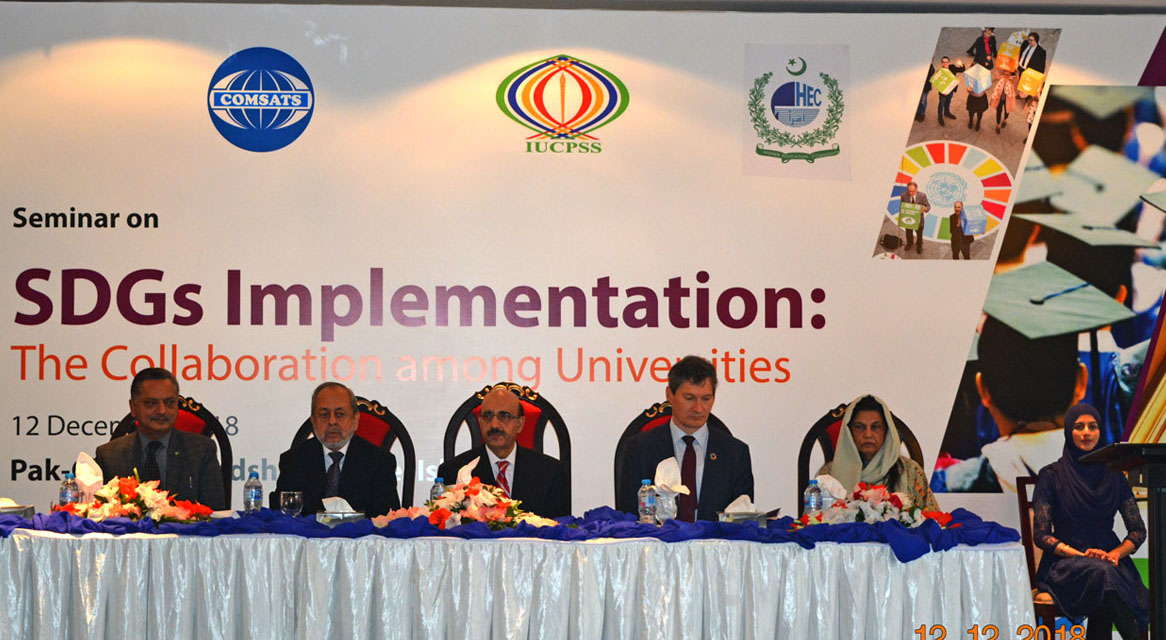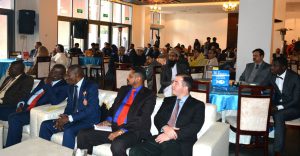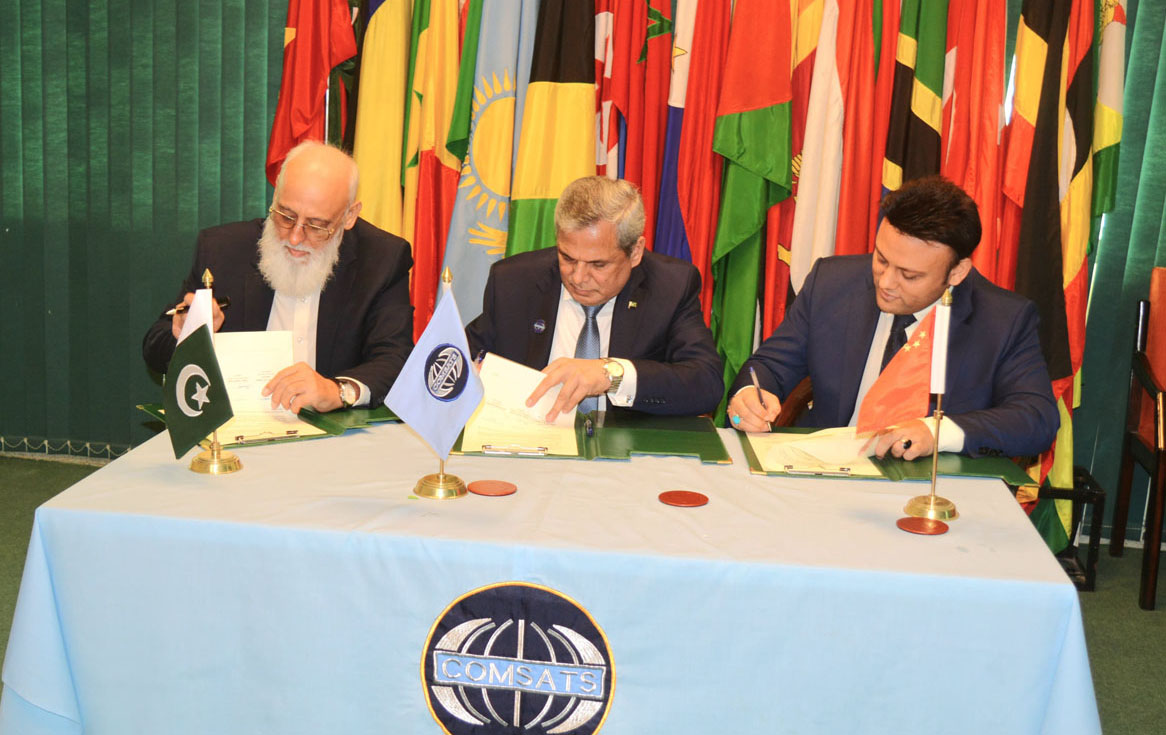In continuation of its initiative to promote and institute 2030 Global Development Agenda, the Commission on Science and Technology for Sustainable Development in the South (COMSATS) organized a seminar on “SDGs Implementation: The Collaboration among Universities” on 12th December 2018 a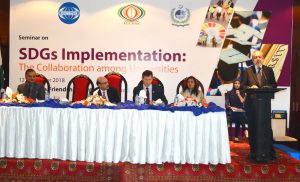 t Pak-China Friendship Centre, Islamabad. The seminar was held in collaboration with the Higher Education Commission (HEC) Pakistan and Inter University Consortium for Promotion of Social Sciences Arts and Humanities (IUCPSS) on the sidelines of International Students Convention and Expo 2018. The inaugural ceremony was attended by over a 100 representatives from academia and diplomatic community of Pakistan.
t Pak-China Friendship Centre, Islamabad. The seminar was held in collaboration with the Higher Education Commission (HEC) Pakistan and Inter University Consortium for Promotion of Social Sciences Arts and Humanities (IUCPSS) on the sidelines of International Students Convention and Expo 2018. The inaugural ceremony was attended by over a 100 representatives from academia and diplomatic community of Pakistan.
Speaking at the inaugural, Dr. S.M. Junaid Zaidi, Executive Director COMSATS, presented the event as a unique platform that aimed to create clusters of relevant individuals and higher education institutions on each of the seventeen SDGs. Based on the available academic resources of the country, Dr. Zaidi hoped that the prese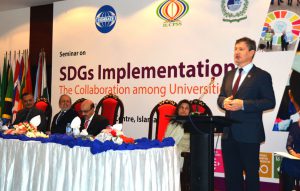 nt event would help make available 10 universities and a thousand faculty members for each of the 17 SDGs.
nt event would help make available 10 universities and a thousand faculty members for each of the 17 SDGs.
In his opening remarks, UN Resident Coordinator, Mr. Niel Buhne highlighted the need for engaging the countries’ youth in constructive activities of national importance, such as policy making, making this huge part of Pakistani population an asset. Mr. Buhne asserted that universities can provide a good conduit between private sector and the educated youth of Pakistan for helping in achieving the SDGs.
His Excellency Sardar Masood Khan, Honourable President of Azad State of Jammu and Kashmir (AJK) graced the event with his presence. Speaking on the occasion, His Excellency highlighted the role of youth and Universities in SDGs for national development and sustainable future at regional and international levels. His Excellency informed that the Government of AJ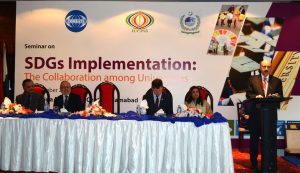 K is also prioritizing the SDGs at the national level. He opined that with ready access to a huge number of the youth that comprises 60 percent of Pakistani population, the Universities can influence the youth for orienting them towards achievement of SDGs. The President AJK appreciated this timely emphasis of COMSATS on SDGs.
K is also prioritizing the SDGs at the national level. He opined that with ready access to a huge number of the youth that comprises 60 percent of Pakistani population, the Universities can influence the youth for orienting them towards achievement of SDGs. The President AJK appreciated this timely emphasis of COMSATS on SDGs.
In his vote of thanks at the inaugural, Mr. Murtaza Noor, Founder of IUCPSS emphasized that partnerships for goals are the keystone for achieving the 2030 Global Agenda.
The technical sessions of the seminar were moderated by Dr. Aneel Salman, Dean, Department of Management Sciences, COMSATS University Islamabad. Mr. Ali Kemal, Economic Policy Advisor at SDGs Support Unit, Ministry of Planning, Development and Reform delivered a presentation on “Implementation status of SDGs in Pakistan”. Mr. Kemal highlighted the priorities of government of Pakistan with regard to the Global Agenda 2030. Dr. Faisal Ahmed Khan, Pro-Vice Chancellor, Balochistan University of Information Technology, Engineering, and Management Sciences (BUITEMS) elucidated the activities of BUITMES being the Hub of United Nations Academic Impact (UNAI) on SDG 8. He informed that BUITMES has taken initiatives such as establishment of National Incubation Center in Quetta and International Centre for Refugee and Migration Studies (ICRMS) for fostering entrepreneurship, creating jobs, and building capacity of workforce and communities in line with Goal 8.
During the event, a brainstorming session was held where representatives from different varsities of Pakistan registered the activities undertaken by their respective institutions and deliberated on the possible strategies and actions to streamline their initiatives with United Nations 2030 Agenda. The dialogues among the participants touched upon policy frameworks, social protection policies, entrepreneurship, international cooperation, equitable quality education, women empowerment, renewable energy, creativity and innovation, institutional building and sustainable infrastructure. As a result of active discussions and deliberations, clusters of universities and academicians on the seventeen SDGs were created in order to increase the participation of academia in the realizing and localization of Global Agenda 2030.
The event ended with the distribution of souvenirs among distinguished speakers.

